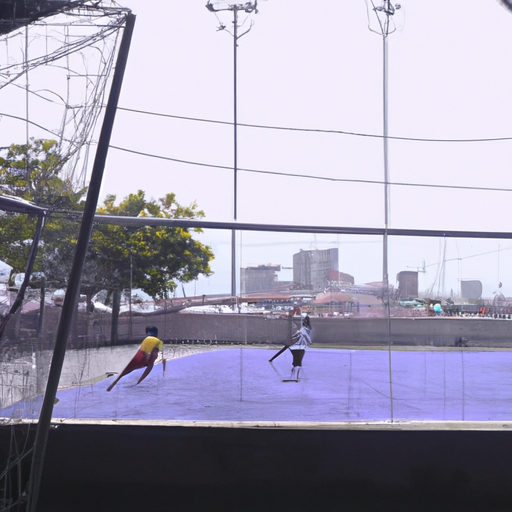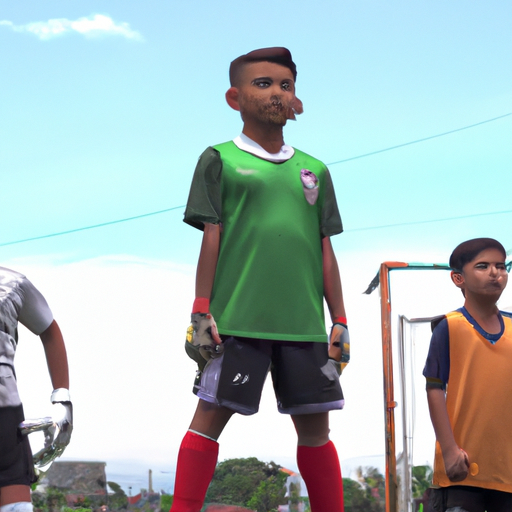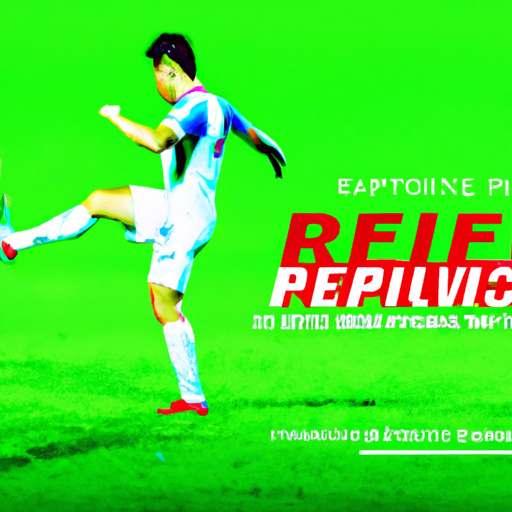Soccer for Social Change: How the Beautiful Game Transforms Lives in the Philippines

Empowering Youth Through Soccer: The Impact of Sports on Underprivileged Communities in the Philippines
Soccer, also known as football, is a sport that has the power to bring people together and create positive change in communities around the world. In the Philippines, soccer is not just a game, but a tool for social change, particularly in underprivileged communities. Through the power of sports, organizations and individuals are empowering youth and transforming lives.
In underprivileged communities, many children face numerous challenges such as poverty, lack of access to education, and limited opportunities for personal growth. However, soccer has emerged as a powerful force that helps these children overcome these obstacles and build a brighter future.
One organization that is making a significant impact is the Gawad Kalinga (GK) Football Club. Founded in 2009, GK Football Club aims to provide underprivileged children with access to quality soccer training and education. Through their programs, they not only teach the fundamentals of the game but also instill important values such as discipline, teamwork, and perseverance.
The impact of GK Football Club can be seen in the lives of the children they serve. Many of these children come from impoverished backgrounds and face numerous challenges in their daily lives. However, through soccer, they find a sense of belonging and purpose. The sport becomes a platform for them to express themselves, develop their skills, and dream of a better future.
Soccer also serves as a means to keep children off the streets and away from negative influences. In underprivileged communities, children are often exposed to drugs, violence, and other harmful activities. By providing them with a safe and structured environment, soccer becomes a powerful tool for keeping them engaged and focused on positive pursuits.
Moreover, soccer has the ability to break down barriers and promote inclusivity. In a country as diverse as the Philippines, where different ethnicities and social classes coexist, soccer provides a common ground for people from all walks of life to come together. Regardless of their background, children can bond over their shared love for the game, fostering a sense of unity and understanding.
The impact of soccer on underprivileged communities goes beyond the field. Many organizations recognize the importance of education and use soccer as a means to encourage children to stay in school. By linking soccer participation to academic performance, these organizations motivate children to prioritize their education and strive for excellence both on and off the field.
Furthermore, soccer has the potential to create opportunities for talented individuals. In recent years, the Philippines has seen a rise in the number of young players who have gone on to represent the country in international competitions. These success stories not only inspire other aspiring players but also shed light on the potential of soccer as a pathway to a better future.
In conclusion, soccer has the power to transform lives in underprivileged communities in the Philippines. Through organizations like GK Football Club, children are given the opportunity to develop their skills, build character, and dream of a brighter future. Soccer not only keeps children off the streets but also promotes inclusivity and unity. By linking soccer participation to education, organizations are motivating children to prioritize their studies. Furthermore, soccer has the potential to create opportunities for talented individuals, opening doors to a better future. The beautiful game is truly making a difference in the lives of underprivileged youth in the Philippines.
Breaking Barriers: How Soccer Promotes Gender Equality and Inclusion in the Philippines

Soccer, also known as football, is a sport that has the power to bring people together and break down barriers. In the Philippines, soccer is not just a game, but a tool for social change. Through the promotion of gender equality and inclusion, soccer has transformed the lives of many individuals in the country.
One of the ways soccer promotes gender equality in the Philippines is by providing equal opportunities for both boys and girls to participate in the sport. Traditionally, soccer has been seen as a male-dominated sport, but organizations and initiatives in the country are working to change this perception. They are creating programs that encourage girls to play soccer and providing them with the same resources and support as their male counterparts.
These programs not only give girls the chance to develop their skills and passion for the game, but they also empower them to challenge societal norms and stereotypes. By playing soccer, girls in the Philippines are breaking barriers and proving that they can excel in a sport that was once considered exclusive to boys. This not only boosts their self-confidence but also inspires other girls to pursue their dreams and aspirations, regardless of societal expectations.
In addition to promoting gender equality, soccer also promotes inclusion in the Philippines. The sport has the power to bring people from different backgrounds and communities together, fostering a sense of unity and belonging. In a country with diverse cultures and ethnicities, soccer serves as a common ground where people can come together and celebrate their shared love for the game.
Through soccer, individuals from marginalized communities, such as indigenous tribes and urban poor areas, are given the opportunity to participate and be part of a team. This inclusion not only provides them with a sense of belonging but also helps to break down social barriers and reduce discrimination. By playing alongside individuals from different backgrounds, stereotypes and prejudices are challenged, leading to a more inclusive and accepting society.
Furthermore, soccer is not just about playing the game, but also about instilling important values and life skills in individuals. Through soccer programs, participants learn the importance of teamwork, discipline, perseverance, and respect. These values are not only applicable on the field but also in their everyday lives.
By promoting gender equality and inclusion, soccer is transforming lives in the Philippines. It is breaking down barriers and empowering individuals to challenge societal norms and stereotypes. Through the sport, girls are given equal opportunities to excel and inspire others, while individuals from marginalized communities are included and given a sense of belonging. Moreover, soccer instills important values and life skills that contribute to personal growth and development.
In conclusion, soccer is not just a game in the Philippines, but a catalyst for social change. Through the promotion of gender equality and inclusion, soccer is transforming lives and breaking down barriers. It is empowering individuals to challenge societal norms, fostering unity and acceptance, and instilling important values and life skills. The beautiful game is truly making a difference in the lives of many in the Philippines.
From the Streets to the Pitch: Soccer as a Tool for Rehabilitation and Social Integration in the Philippines
Soccer, also known as football, is a sport that has the power to bring people together and create positive change in communities around the world. In the Philippines, soccer has become a tool for rehabilitation and social integration, helping to transform the lives of individuals who have faced adversity.
In many parts of the Philippines, especially in urban areas, poverty, crime, and drug addiction are prevalent issues. These challenges often lead to a cycle of violence and despair, leaving many individuals feeling hopeless and marginalized. However, soccer has emerged as a way to break this cycle and provide a path towards a brighter future.
One organization that has been at the forefront of using soccer for social change in the Philippines is the Gawad Kalinga (GK) Football for a Better Life program. This program aims to empower individuals, particularly those from disadvantaged backgrounds, by providing them with opportunities to play soccer and develop life skills.
Through the GK Football for a Better Life program, individuals who have experienced drug addiction, gang involvement, or other forms of social exclusion are given a chance to reintegrate into society. The program uses soccer as a means to teach discipline, teamwork, and resilience, while also providing participants with access to education and employment opportunities.
The impact of the program has been remarkable. Many participants have reported a significant improvement in their self-esteem and overall well-being. By being part of a team and working towards a common goal, individuals gain a sense of belonging and purpose. This newfound confidence often translates into other areas of their lives, such as their relationships with family and friends, as well as their ability to secure stable employment.
Moreover, soccer has also been instrumental in bridging divides and fostering social cohesion in communities. In the Philippines, where there are often deep-seated divisions based on socio-economic status, ethnicity, or religion, soccer has the power to bring people from different backgrounds together.
Through soccer tournaments and friendly matches, individuals from different communities have the opportunity to interact and build relationships. These interactions help break down stereotypes and prejudices, fostering a sense of unity and understanding among participants.
Furthermore, soccer has also been used as a tool for peacebuilding in conflict-affected areas of the Philippines. In regions where armed conflict has torn communities apart, soccer has provided a platform for dialogue and reconciliation.
Organizations such as the Philippine Football Federation (PFF) have been working with local communities to organize soccer tournaments and training programs in conflict-affected areas. These initiatives not only promote physical health and well-being but also create opportunities for dialogue and understanding among individuals who may have previously been on opposing sides.
In conclusion, soccer has proven to be a powerful tool for rehabilitation and social integration in the Philippines. Through programs like the GK Football for a Better Life program and initiatives by the PFF, individuals who have faced adversity are given a chance to rebuild their lives and contribute positively to their communities. Soccer has the ability to transform lives, break down barriers, and create a more inclusive and harmonious society.





